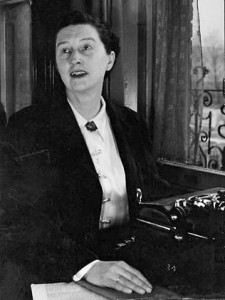Note: Australian author Christina Stead was WINNER of the inaugural Patrick White Award in 1974. Her own Christina Stead Award was established in 1979 and was won that year by David Malouf for An Imaginary Life.
“London’s Times Literary Supplement placed Christina Stead in the company of Tolstoy, Dostoevsky, Ibsen, and Joyce. And Clifton Fadiman has said she is the most extraordinary woman novelist produced by the English speaking world since Virginia Woolf. Christina Stead is perhaps the supreme example today of the writer’s writer, admired by such exemplars of the craft as Robert Lowell, Jean Stafford, and Alfred Kazin.”
 Winner of the prestigious Patrick White Award in her native Australia in 1979, Christina Stead (1902 – 1983), acclaimed in England and Australia, still remains unknown to most readers in the United States, and that’s a pity. Her 1973 novel The Little Hotel, given to me by a friend from England, reveals her deliciously twisted sense of humor, her pointed social satire, and her vividly depicted but often very sad characters, and I am now poring through Amazon’s Marketplace listings to find as many of her other sadly neglected novels as I can. In this novel, set in a small hotel on Lake Geneva in the immediate aftermath of World War II, Stead introduces an assortment of bizarre characters who live at the small Hotel Swiss-Touring for various lengths of time, some of them for a season, and a few as residents. Most of them are there because they cannot afford the more elegant accommodations to which they have been accustomed, though the twenty-six-year-old hotelkeeper, Selda Bonnard, and her slightly older husband Roger do their best to meet their guests’ needs. Touring artists associated with a local nightclub, and the road companies that play the casino, also occupy the hotel, residing on another floor above the guests.
Winner of the prestigious Patrick White Award in her native Australia in 1979, Christina Stead (1902 – 1983), acclaimed in England and Australia, still remains unknown to most readers in the United States, and that’s a pity. Her 1973 novel The Little Hotel, given to me by a friend from England, reveals her deliciously twisted sense of humor, her pointed social satire, and her vividly depicted but often very sad characters, and I am now poring through Amazon’s Marketplace listings to find as many of her other sadly neglected novels as I can. In this novel, set in a small hotel on Lake Geneva in the immediate aftermath of World War II, Stead introduces an assortment of bizarre characters who live at the small Hotel Swiss-Touring for various lengths of time, some of them for a season, and a few as residents. Most of them are there because they cannot afford the more elegant accommodations to which they have been accustomed, though the twenty-six-year-old hotelkeeper, Selda Bonnard, and her slightly older husband Roger do their best to meet their guests’ needs. Touring artists associated with a local nightclub, and the road companies that play the casino, also occupy the hotel, residing on another floor above the guests.
 Gradually, through Selda Bonnard’s first person narrative, the reader comes to know the various guests at the hotel. One, who claims to be the Mayor of B in Belgium, appears to be certifiable, creating numbered documents about his stay in the hotel, going every day to nearby Evian to buy a dozen bottles of champagne at a lower price than he can get locally, and traveling to “the clinic” daily for “injections” and shock treatments. A Mrs. Blaise, whose husband comes to visit every other weekend from Basel, bringing the drugs she needs for her “illnesses,” claims to have millions of dollars and packets of jewels, acquired from some mysterious provenance during the war, safely stowed in New York banks. Mrs. Trollope, a dark woman from “the East,” lives with her “cousin,” Robert Wilkins, who is constantly following the exchange rates and suggesting that his “cousin” move her accounts closer to where they live and certainly out of England. A large packet of her money is in the safe at the hotel, but it is registered there under his name. A strange English woman named Miss Abbey-Chillard, who appears to have almost no money, also appears to have serious health issues and demands special foods.
Gradually, through Selda Bonnard’s first person narrative, the reader comes to know the various guests at the hotel. One, who claims to be the Mayor of B in Belgium, appears to be certifiable, creating numbered documents about his stay in the hotel, going every day to nearby Evian to buy a dozen bottles of champagne at a lower price than he can get locally, and traveling to “the clinic” daily for “injections” and shock treatments. A Mrs. Blaise, whose husband comes to visit every other weekend from Basel, bringing the drugs she needs for her “illnesses,” claims to have millions of dollars and packets of jewels, acquired from some mysterious provenance during the war, safely stowed in New York banks. Mrs. Trollope, a dark woman from “the East,” lives with her “cousin,” Robert Wilkins, who is constantly following the exchange rates and suggesting that his “cousin” move her accounts closer to where they live and certainly out of England. A large packet of her money is in the safe at the hotel, but it is registered there under his name. A strange English woman named Miss Abbey-Chillard, who appears to have almost no money, also appears to have serious health issues and demands special foods.

A little hotel on Lake Geneva, similar to that described in this novel. Artist unknown.
These five permanent guests form the core of the novel, and as they reveal themselves through their conversations and interactions, they begin to resemble characters in a dramatic comedy of manners. The hotel employees all seem to resent them and their frequently high-handed demands, and an undercurrent of cruelty by the employees toward the guests emerges. Roger, the husband of Selda Bonnard, is constantly listening in on them and occasionally checking their belongings when they are out, especially when they claim not to be able to pay their bills. A new employee begins spying at keyholes and appears to be plotting something with one of the maids, another maid deliberately spills food and drink on certain vulnerable female guests, and petty thefts occur. Even Selda Bonnard does not escape the gossip and nastiness when rumors circulate about an affair in which her husband may be participating.
The Mayor of B provides unintentional comic relief throughout, and when he begins to imitate the strip tease dancer who lives upstairs, his deep-seated problems become public. Gradually, through the characters’ conversations, the reader learns the nature of the relationships among all the other characters, with most of the action eventually focused on the relationship of Mrs. Trollope and her “cousin,” Robert Wilkins. All the women at the hotel soon reveal themselves to be unhappy at their inability to lead the kinds of lives they wish for in a society ruled by their men, and in time, some of them begin to seek control of their own lives.

Tour de Peilz, the site of the Swiss Games Museum, near Montreux, "a short ride" from the Little Hotel
All of Stead’s characters are flawed, and since all are shown in intimate scenes in which they reveal themselves, at least to the reader, they inspire a kind of empathy within the reader – and even a pervading sadness – which does not often happen within social satire, which is usually characterized by sterotypes. Even Mme. Bonnard, the hotel keeper, has her problems, some of them related to her German Swiss background and the attitudes toward Germans which she sees all around her. Her inflexibility regarding aspects of the hotel management make her a less than sympathetic character at some points, though she is the main, unifying character. Sadly, her opinion of the hotel differs markedly from reality – and the way guests perceive it. The Little Hotel, elegant and consummately literary, builds an intense, and sometimes claustrophobic atmosphere through the characters and setting in a Lake Geneva community as they try to live their straitened lives and survive to live another day in a changed world. Christina Stead, a writer who is among the best of the best of her day, and who can easily hold her own with contemporaries Beryl Bainbridge, Fay Weldon, Penelope Lively, and Muriel Spark in England, and Thea Astley and Elizabeth Jolley in Australia, deserves much more recognition from the literary public in the U.S. Had it not been for a close friend’s thoughtfulness in giving me this book for Christmas, I’d never have discovered her at all. I hope a few readers here will now discover her, too – her work is extraordinary.
Photos, in order: The author photo appears on http://www.theaustralian.com.au/
The picture of the Little Hotel, overlooking a lake, by an unknown artist, appears on the cover of the 1975 US edition of this novel, published by Holt, Rinehart, and Winston.
Tour de Peilz, a community on Lake Geneva near the Little Hotel, near Montreux, is the site of the Swiss Games Museum. http://www.myswitzerland.com/
